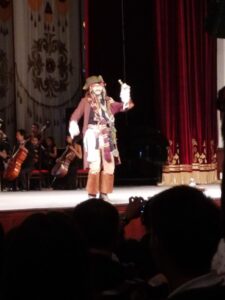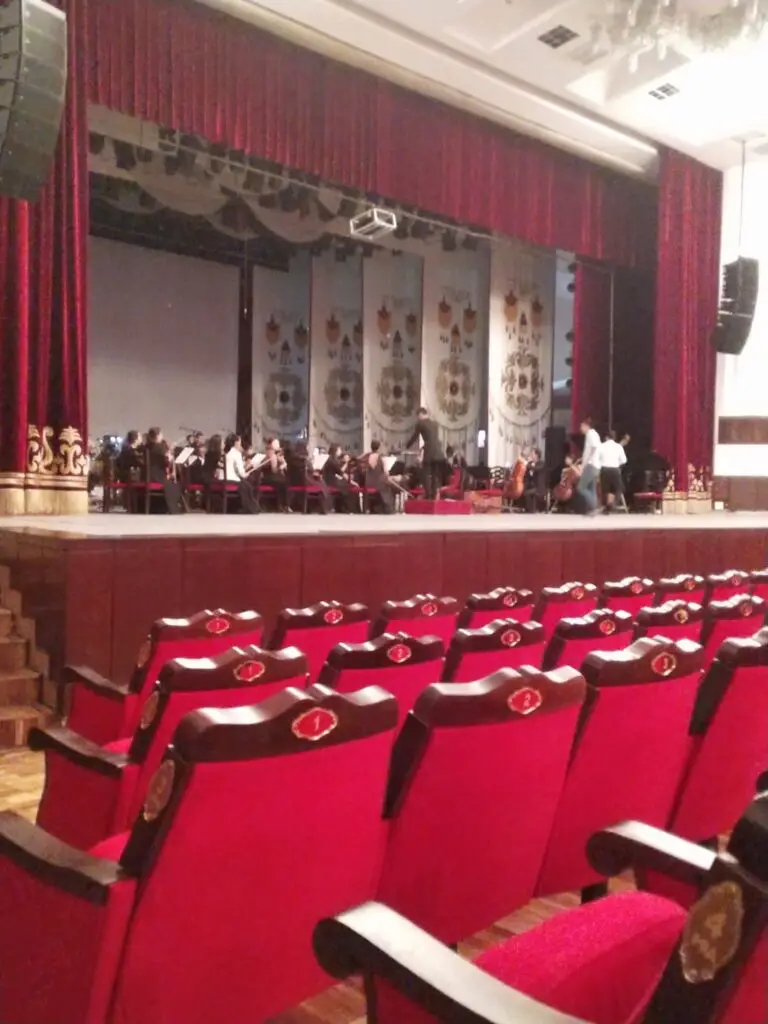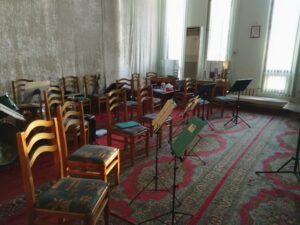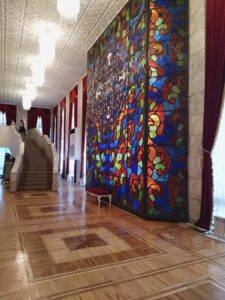On Friday, September 20, Ne Prosto Orchestra performed at the Bishkek’s Philharmonic. Ne Prosto Orchestra (The Not Just an Orchestra) is based out of Almaty, Kazakhstan. They are a group of young musicians that specialize in playing movie soundtrack scores. Originally put together by a few recent college graduates trying to figure out how to make a living with their music degrees, the group now hosts a few dozen performers who travel widely within Eurasia and perform successfully within the grey zone of high art and pop culture.

Their Bishkek performance was based on the Harry Potter and Pirates of the Caribbean series. The performance consisted of an orchestra and choir set to match selected clips from both movie series. To break up the two series, there was an intermission halfway through the show. Highlights from all films spanning both series were used. Just as you would have at any performance, there was an encore at the very end. Since the movie montages has already reached their conclusion, the encore was a short clip of the Matrix, specifically the part where the protagonist must pick the red or blue pill. With all of the clips that were played being famous American films, this served as a reminder to me as to how pervasive American pop culture is worldwide. The most interesting thing about seeing these movie clips in another country was that portions of the movies were dubbed in Russian, played over the sound of the orchestra.
I personally enjoyed the performance very much because it combined a few of my interests – live orchestras, a choir, and American movies. In all honesty, I have not seen all of the Harry Potter movies or Pirates of the Caribbean. The Matrix was the only movie included that I had seen. Despite this, I was surprised that I still recognized some of the scenes from Harry Potter. I enjoyed the way that the music was set to film and thought that it matched the scenes very well, particularly when there were moments of suspense. It was radically different than anything I had ever experienced before. It also piqued my interest in setting aside time to watch these American movie series.
In total, the performance ran about two hours. It did, however, start a half an hour late because some of the performers arrived late.

The general entrance fee for this performance ranged anywhere from 1200 soms to 1700 soms ($18-$25). Tickets can be bought both online at ticket.kg or in person at the venue. However, since one of the other SRAS students has a host mom that works at the Philharmonic, we were invited to attend for free and even had a backstage tour.
The Philharmonic building itself is in Bishkek’s city center and is one of its biggest architectural attractions. In front of the white-marbled building is a large statue of the Kyrgyz national hero, Manas, with smaller statues of Kanykei, Manas’s wife, and Bakai, his spiritual advisor, at its base. The institution was dedicated to composer Toktogul Satylganov, an improviser and poet who set his words to music. He remains one of the most influential figures in Kyrgyz arts, and is considered to be one of the founders of Kyrgyz literature.
We entered through the back door with our private guide and walked past the stage and saw some of the dressing and green rooms. On one of the upper-level floors, my friend’s host mom showed us her classroom. Her specialty is the violin. She introduced us to what we would see that night by showing us videos online of a Ne Prosto Orchestra performance in Russia.
We then went to the seating area. The Philharmonic has a main level and an upper level. The performance was not sold out and we were easily able to find seats on the main level. The inside of the Philharmonic is equally as magnificent. The Philharmonic was recently renovated and now the white marbled walls on the outside match the inside and there is red carpet in the main hallway leading to the auditorium. Electric chandeliers, both big and small, light the venue. This may be one of the fanciest buildings in all of Kyrgyzstan, aside from those used by the president.
As it does not have its own performing group, performances are held sporadically at the Philharmonic. It does not operate its own website either. Thus, the easiest way to find a schedule is by looking at tickets.kg. Attending a performance at the Philharmonic is a great way to experience both local culture and art within Kyrgyzstan.
You Might Also Like

Kasta / Каста
Kasta (Каста) is a Russian rap group originally from Rostov-on-Don, whose core members are the MCs Vladi (Влади), Shym (Шым), Khamil (Хамиль), and Snake (Змей). Exposure to New York’s Wu-Tang Clan in the early nineties prompted them to purchase as many American rap cassettes as they could get their hands on, and to study English […]

Naik Borzov / Найк Борзов
Naik Borzov (Найк Владимирович Борзов) is a Russian rock musician, poet, and singer-songwriter. He is known as the founder of the seminal but short-lived Russian punk band Infection (Инфекция), and more widely for his solo work. Naik organized Infection when he was only 14 years old. During their early career, the group produced two full-length albums, Onanism […]

Piotr Bukartyk
Piotr Bukartyk is a Polish singer, composer, and artist. His personal style and artistic legacy can be compared to figures such as Mirosław Czyżykiewicz and Marek Grechuta. Bukartyk was born in Zielona Góra and grew up in Gorzów Wielkopolski, a small city in northwestern Poland. He started singing and writing music in high school and […]

Buranovskiye Babushki / Бурановские Бабушки
Buranovskiye Babushki (Бурановские Бабушки) is a long-running traditional folk choir from Buranovo, Russia. They sing predominantly in their native Udmurt language, a subgroup of the Uralic language family, which also includes Finnish, Hungarian, and Estonian. Formed in 1968 in an effort to preserve the local singing traditions, the group came to national prominence 40 years later […]

Patryk Kumór
Patryk Kumór (also known as Spectre) is a Polish pop singer and songwriter based in Warsaw who rapidly rose to fame during the 2013 season of Polsat’s Must Be the Music talent show. In May, 2014 he released his debut solo album 13, and a year later a second album, 2/2, which the Polish Society of […]







